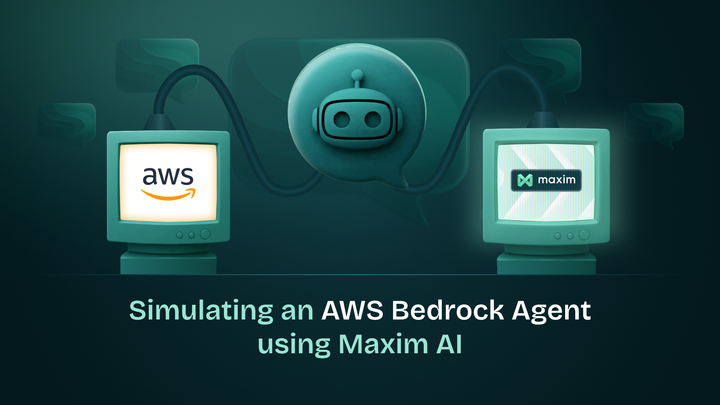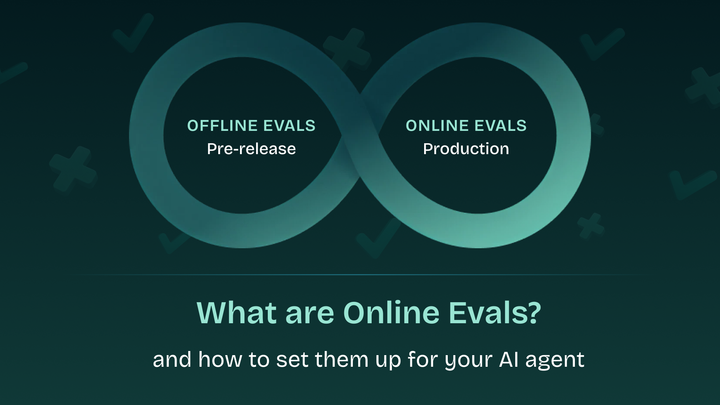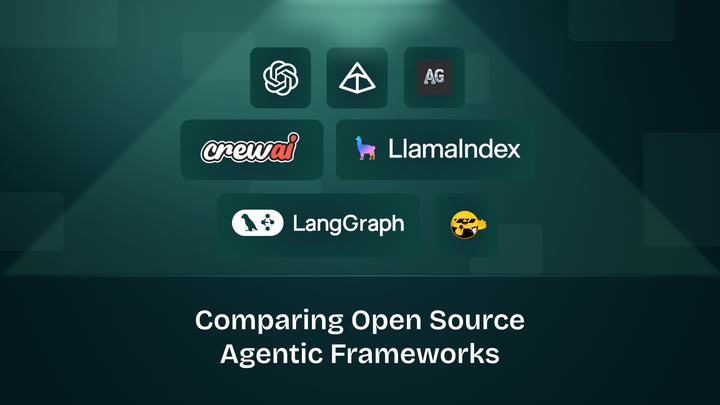Making a Financial Conversation Agent using Agno & Maxim

In today's fast-paced financial world, having instant access to market data, company information, and financial insights is crucial for investors, analysts, and financial professionals. In this comprehensive tutorial, we'll build a sophisticated financial conversational agent that combines the power of multiple AI models with real-time financial data and web search capabilities.
What We'll Build
By the end of this tutorial, you'll have created a multi-agent financial assistant that can:
- Fetch real-time stock prices and financial data using YFinance
- Search the web for the latest financial news and information
- Provide analyst recommendations and company insights
- Handle complex financial queries through natural conversation
- Display data in well-formatted tables and reports
Prerequisites
Before we begin, ensure you have:
- Python 3.8 or higher installed
- Basic knowledge of Python programming
- OpenAI API key (or Google Gemini API key)
- Understanding of financial markets (helpful but not required)
Required Libraries
We'll be using several powerful libraries:
- Agno: A framework for building AI agents with tool integration
- Maxim AI: For enhanced observability and logging
- YFinance: For fetching financial data
- Google Search Tools: For web search capabilities
- OpenAI/Gemini: For language model integration
The code of this agent can be accessed here - Maxim Cookbook
Step 1: Setting Up the Environment
First, let's install the required packages and set up our environment:
You can pip or uv to install the following dependencies or add them in pyproject.toml -
dependencies = [
"agno",
"openai",
"google-genai",
"python-dotenv",
"ddgs",
"yfinance",
"googlesearch-python",
"pycountry",
"maxim-py",
]Create a .env file in your project directory with your API keys:
GOOGLE_API_KEY=Now, let's import all the necessary libraries:
from dotenv import load_dotenv
from agno.agent import Agent
from agno.models.openai import OpenAIChat
from agno.tools.googlesearch import GoogleSearchTools
from agno.tools.yfinance import YFinanceTools
from maxim import Maxim
from maxim.logger.agno import instrument_agnoStep 2: Loading Environment Variables and Setting Up Logging
The first step in our application is to load environment variables and set up enhanced logging with Maxim:
# Load environment variables from .env file
load_dotenv()
# Instrument agno with Maxim's logger for enhanced observability
instrument_agno(Maxim().logger())Why this matters:
- Environment variables keep your API keys secure
- Maxim's logging provides detailed insights into agent interactions
- Enhanced observability helps debug and monitor agent performance
Step 3: Creating the Web Search Agent
Our first agent specializes in searching the web for financial information:
# Web Search Agent: Fetches financial information from the web
web_search_agent = Agent(
name="Web Agent",
role="Search the web for information",
model=OpenAIChat(id="gpt-4o"),
tools=[GoogleSearchTools()],
instructions="Always include sources",
show_tool_calls=True,
markdown=True,
)
Key features:
- Uses GPT-4o for intelligent query processing
- Integrated with Google Search through GoogleSearchTools
- Always includes sources for transparency
- Outputs responses in markdown format
Step 4: Creating the Finance Agent
Our second agent focuses on retrieving structured financial data:
finance_agent = Agent(
name="Finance Agent",
role="Get financial data",
model=OpenAIChat(id="gpt-4o"),
tools=[YFinanceTools(
stock_price=True,
analyst_recommendations=True,
company_info=True
)],
instructions="Use tables to display data",
markdown=True,
)Capabilities:
- Real-time stock price data
- Analyst recommendations and ratings
- Comprehensive company information
- Data presented in clean, readable tables
Step 5: Creating the Multi-Agent System
Now we'll combine both agents into a unified system:
# Aggregate both agents into a multi-agent system
multi_ai_agent = Agent(
team=[web_search_agent, finance_agent],
model=OpenAIChat(id="gpt-4o"),
instructions="You are a helpful financial assistant. Answer user questions about stocks, companies, and financial data.",
show_tool_calls=True,
markdown=True
)
Benefits of the multi-agent approach:
- Specialized agents handle specific tasks efficiently
- Seamless coordination between different data sources
- Improved response quality through task specialization
- Better error handling and fallback mechanisms
Step 6: Building the Interactive Interface
Finally, let's create the main interactive loop:
if __name__ == "__main__":
print("Welcome to the Financial Conversational Agent! Type 'exit' to quit.")
messages = []
while True:
print("********************************")
user_input = input("You: ")
if user_input.strip().lower() in ["exit", "quit"]:
print("Goodbye!")
break
# Add user message to conversation history
messages.append({"role": "user", "content": user_input})
# Build conversation context
conversation = "\\n".join([
("User: " + m["content"]) if m["role"] == "user"
else ("Agent: " + m["content"])
for m in messages
])
# Get response from multi-agent system
response = multi_ai_agent.run(
f"Conversation so far:\\n{conversation}\\n\\nRespond to the latest user message."
)
agent_reply = getattr(response, "content", response)
print("---------------------------------")
print("Agent:", agent_reply)
# Add agent response to conversation history
messages.append({"role": "agent", "content": str(agent_reply)})
How It Works
Agent Coordination
The multi-agent system intelligently routes queries to the appropriate agent:
- Stock price queries → Finance Agent (YFinance)
- News and analysis → Web Search Agent (Google Search)
- Complex queries → Both agents working together
Conversation Memory
The system maintains conversation history, allowing for:
- Follow-up questions
- Contextual responses
- Reference to previous queries
Error Handling
Built-in error handling ensures:
- Graceful degradation when APIs are unavailable
- Informative error messages
- Fallback to alternative data sources
Example Usage
Here are some example queries you can try:
You: What's the current stock price of Apple?
Agent: [Fetches real-time AAPL data with price, volume, and key metrics]
You: Give me the latest news about Tesla
Agent: [Searches web for recent Tesla news with sources]
You: Compare Microsoft and Google's financial performance
Agent: [Combines financial data and recent analysis for both companies]
Advanced Features
Custom Instructions
You can customize agent behavior by modifying the instructions parameter:
finance_agent = Agent(
# ... other parameters
instructions="Focus on risk analysis and provide conservative investment advice. Always include disclaimer about financial risks."
)
Model Flexibility
The system supports multiple LLM providers:
# OpenAI
model=OpenAIChat(id="gpt-4o")
# Google Gemini (commented in original code)
# model=Gemini(id="gemini-2.0-flash-001")
Enhanced Observability
Maxim provides detailed logging for:
- Agent interactions
- Tool usage
- Performance metrics
- Error tracking
Extending the System
Adding New Agents
You can easily add specialized agents:
news_agent = Agent(
name="News Agent",
role="Financial news analysis",
model=OpenAIChat(id="gpt-4o"),
tools=[NewsAPITools()],
instructions="Provide sentiment analysis for financial news"
)
Custom Tools
Create custom tools for specific financial APIs:
class CustomFinancialTool:
def get_crypto_data(self, symbol: str):
# Custom implementation
pass
Web Interface
Consider building a web interface using Flask or FastAPI:
from flask import Flask, request, jsonify
app = Flask(__name__)
@app.route('/query', methods=['POST'])
def handle_query():
user_query = request.json['query']
response = multi_ai_agent.run(user_query)
return jsonify({'response': str(response)})
Conclusion
We've successfully built a sophisticated financial conversational agent that combines multiple AI models with real-time data sources. The system can handle complex financial queries, provide up-to-date market information, and maintain conversational context.
Key Takeaways
- Multi-agent architecture provides better specialization and performance
- Agno framework simplifies AI agent development and tool integration
- Maxim logging offers valuable insights into agent behavior
- Modular design makes the system easy to extend and maintain
Disclaimer: This tutorial is for educational purposes only. Always consult with qualified financial advisors before making investment decisions.


